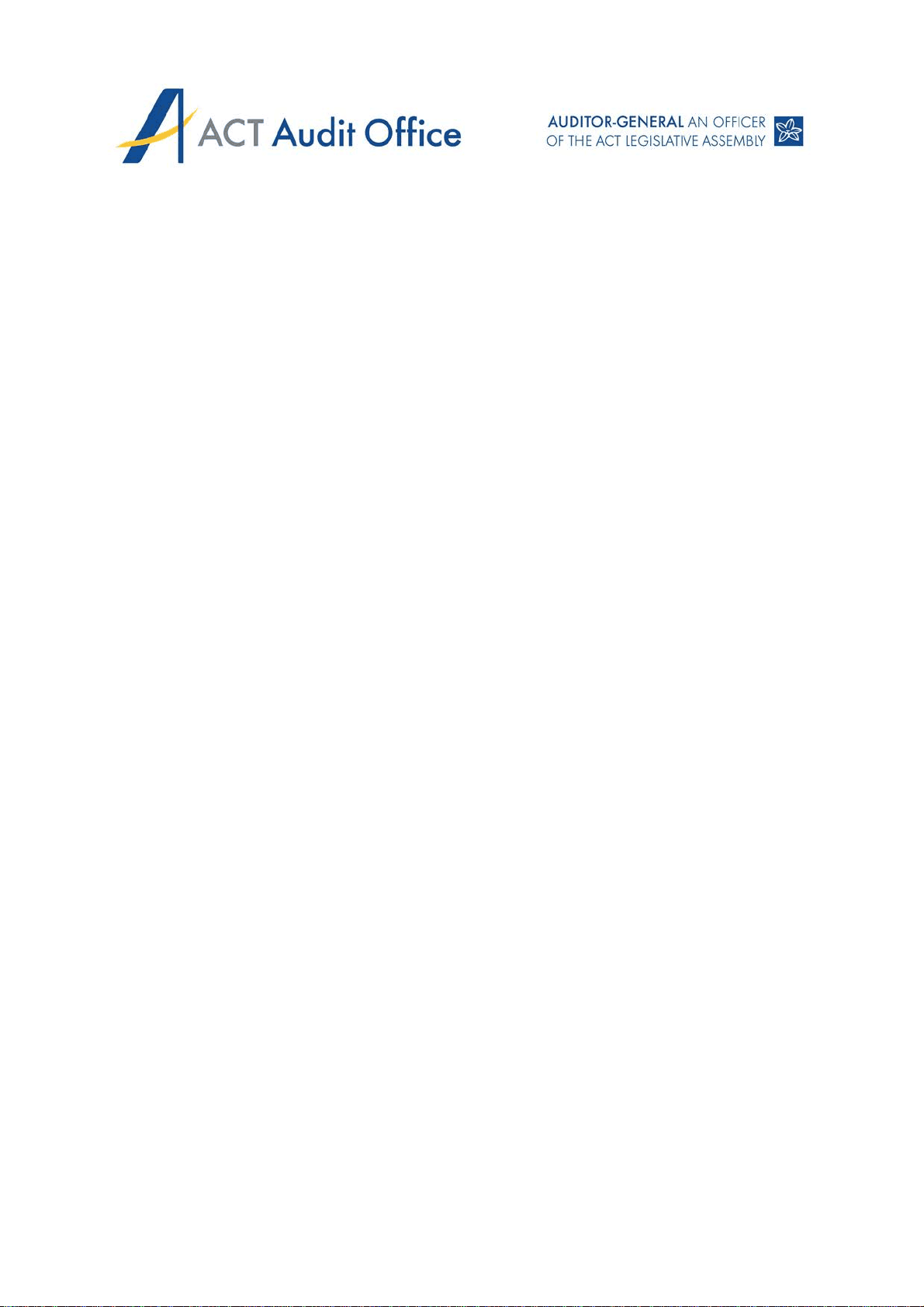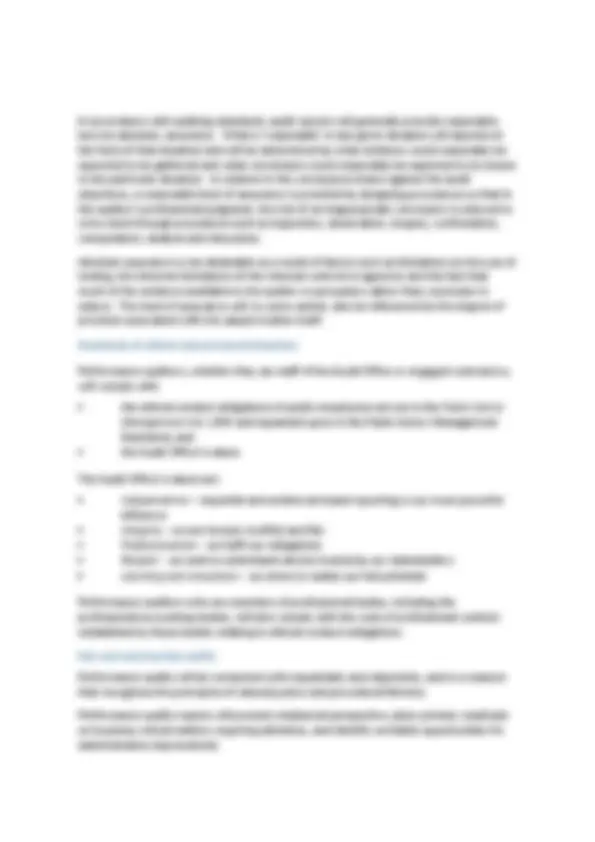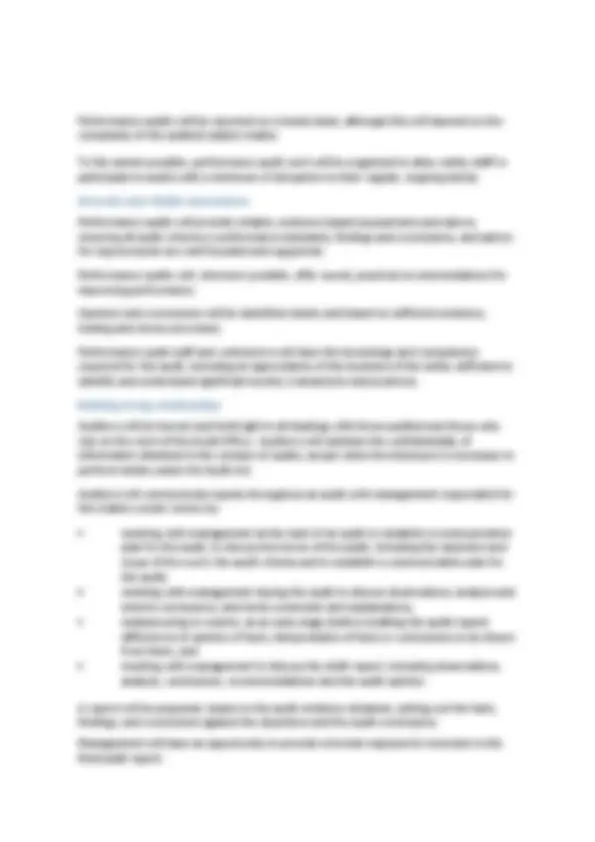





Study with the several resources on Docsity

Earn points by helping other students or get them with a premium plan


Prepare for your exams
Study with the several resources on Docsity

Earn points to download
Earn points by helping other students or get them with a premium plan
Community
Ask the community for help and clear up your study doubts
Discover the best universities in your country according to Docsity users
Free resources
Download our free guides on studying techniques, anxiety management strategies, and thesis advice from Docsity tutors
The role and responsibilities of the Auditor-General for the Australian Capital Territory (ACT) and the Audit Office in conducting performance audits. the objectives of performance audits, which include promoting accountability and providing independent assessments to the Legislative Assembly. It also covers the basic principles of conducting a performance audit, such as maintaining trust and confidence, applying professional standards, and providing accurate and reliable assessments. The document emphasizes the importance of independence, integrity, professionalism, respect, learning and innovation, and ethical conduct in the performance audit process.
Typology: Summaries
1 / 5

This page cannot be seen from the preview
Don't miss anything!




The Auditor-General for the ACT is a statutory position created by the ACT Legislative Assembly under the Auditor-General Act 1996 (the Audit Act). The Auditor-General is responsible to the ACT public, through its elected representatives in the Legislative Assembly, for the audit of all ACT public sector agencies.
The Audit Office supports the Auditor-General in carrying out the functions of the Office. The Office undertakes audits of management performance and the financial statements of public sector bodies. The aim of these audits is to promote accountability and provide independent assessments to the Legislative Assembly, including on whether the ACT Public Service and its resources are effectively and efficiently managed.
The Audit Office operates principally under the Audit Act. The Audit Act defines the Auditor-General’s mandate, responsibilities, powers and reporting requirements.
The Audit Act also establishes the independence of the Auditor-General, prescribing that the Auditor-General:
In this respect, the Auditor-General has complete independence in determining the performance audit program, including what to audit, how to audit and what to report.
Through its performance audits, the Audit Office seeks to enhance ACT Public Sector performance and accountability. In this respect, the objectives of the Office are to undertake a program of audits to produce independent reports with the purpose of:
The objectives of a performance audit are twofold. The first objective is to provide the Legislative Assembly with an independent assessment of the quality of management of public resources. The second objective is to assist public sector managers by identifying and promoting better management practices.
Section 11B of the Audit Act provides that a ‘performance audit, of a person, body or thing, means a review of any aspect of the operations of the entity.’
In this respect, performance audits may address any matter related to public accountability for the administration of the Territory.
Performance audits typically evaluate the economy, efficiency and administrative effectiveness of ACT Public Sector entities. This can include an examination of governance issues, such as risk management and other control structures, a review of the use of human, financial and other resources, information systems, performance measures, reporting and monitoring systems, probity and legal compliance..
The performance audit mandate stops short of reviewing the merits of government policy decisions. The scope may, however, incorporate information leading to policy decisions, an assessment of the extent to which policy objectives have been met, and an assessment of the results of policy implementation both within the administering body and externally.
Achieving the key objectives of the Audit Office requires a commitment to maintaining the trust and confidence of audited entities and those who rely on the performance audit work of the Office. In doing this, the Audit Office will:
Professional standards and accepted better practice
All performance audits will be conducted in accordance with the principles, procedures and guidance contained in Australian Auditing Standards relevant to performance auditing. These standards prescribe the minimum standards of professional audit work expected of performance auditors, whether they are staff of the Audit Office or contractors engaged under section 9D of the Audit Act.
In meeting these standards, performance audits will apply sound auditing methodologies and techniques and adopt better practices, as reflected in the Performance Audit Methods and Practices (PAMPR) manual.
Performance audits will be reported on a timely basis, although this will depend on the complexity of the audited subject matter.
To the extent possible, performance audit work will be organised to allow entity staff to participate in audits with a minimum of disruption to their regular, ongoing duties.
Accurate and reliable assessments
Performance audits will provide reliable, evidence-based assessments and advice, ensuring all audit criteria or performance standards, findings and conclusions, and advice for improvement are well-founded and supported.
Performance audits will, wherever possible, offer sound, practical recommendations for improving performance.
Opinions and conclusions will be identified clearly and based on sufficient evidence, testing and review processes.
Performance audit staff and contractors will have the knowledge and competence required for the audit, including an appreciation of the business of the entity sufficient to identify and understand significant events, transactions and practices.
Building strong relationships
Auditors will be honest and forthright in all dealings with those audited and those who rely on the work of the Audit Office. Auditors will maintain the confidentiality of information obtained in the conduct of audits, except when the disclosure is necessary to perform duties under the Audit Act.
Auditors will communicate openly throughout an audit with management responsible for the matters under review by:
A report will be prepared, based on the audit evidence obtained, setting out the facts, findings, and conclusions against the objectives and the audit conclusions.
Management will have an opportunity to provide a formal response for inclusion in the final audit report.
To the extent possible, performance audit work will be organised to minimise disruption to the regular duties of management and staff of the audited agency.
Dr Maxine Cooper 6 August 2014
Dr Maxine Cooper, Auditor-General Date